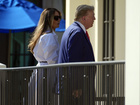Spotlight
European Union leaders gathered Thursday to consider new ways to help boost arms and ammunition production for Ukraine and to discuss the war in Gaza amid deep concern about Israeli plans to launch a ground offensive in the city of Rafah.
Ukraine's munition stocks are desperately low, and Russia has more and better-armed troops. There is also a growing awareness that the EU must provide for its own security, with election campaigning in the U.S. raising questions about Washington's commitment to its allies.
 Full Story
Full Story
A 12-year-old boy in east Jerusalem lights the fuse of a long firework and hoists it in the air. Then, just before it explodes and illuminates the night sky with a burst of red, he is shot in the chest by Israeli police and falls to the ground.
A clip of Rami Halhouli's final moments last week has been circulating on social media for days. Human rights activists say it shines a light on the surge of Palestinians — including dozens of children — who have been killed without justification by Israeli forces since Oct. 7.
 Full Story
Full Story
Israel is determined to launch a ground offensive against Hamas in Rafah, Gaza's southernmost city, a plan that has raised global alarm because of the potential for harm to the hundreds of thousands of civilians sheltering there.
Prime Minister Benjamin Netanyahu says Israel can't achieve its goal of "total victory" against Hamas without going into Rafah.
 Full Story
Full Story
U.S. Secretary of State Antony Blinken will travel to Israel this week as part of his sixth urgent mission to the Middle East since the Israelis' war with Hamas began in October, as relations between the two countries have soured dramatically in recent weeks.
The visit comes amid a flurry of calls, planned trips by U.S. and Israeli officials and public airings of severe disagreements over the state of the conflict — notably Israeli plans to mount a major military operation in the southern Gaza city of Rafah and what will happen to Gaza after the war ends.
 Full Story
Full Story
After the mountainside collapsed, obliterating a neighborhood and 43 lives in the worst landslide disaster in U.S. history, Jessica Pzsonka made a promise -– to herself, to her bereft parents and to her late sister, who was buried along with two young sons, her husband and in-laws.
Pszonka would see a permanent memorial created where relatives and visitors could feel her sister's presence and reflect on the serenity that drew the family to Oso, as well as the forces that left an immense scar in the forested Cascade Mountain foothills along the north fork of the Stillaguamish River, 55 miles (89 km) northeast of Seattle.
 Full Story
Full Story
On this, the leaders of tennis can agree: There is more money out there to be made. And they see eye-to-eye on this, too: The sport's current structure could stand to change.
The how's and why's and when's of it all? Well, that's open to discussion — and there is plenty of that happening now behind closed doors, conversations and negotiations about the future of tennis among the folks who run the Grand Slam tournaments and other events, the women's WTA and men's ATP professional tours, the players, their agents and others with a hand in the sport, including Saudi Arabia's Private Investment Fund (known as the PIF, it is the entity behind LIV Golf ).
 Full Story
Full Story
A Dubai sovereign wealth fund that's the single-largest shareholder in the Nasdaq stock index plans to sell a third of its shares in the exchange, a deal potentially worth some $1.6 billion that saw the value of the firm fall in aftermarket trading Wednesday.
The announcement from Borse Dubai, owned by the Investment Corp. of Dubai, would make it the second-largest holder in the Nasdaq, a technology-heavy exchange that's one of the three main indexes in the United States.
 Full Story
Full Story
Lawyers for Donald Trump urged the U.S. Supreme Court on Tuesday to dismiss an indictment charging the former president with conspiring to overturn the results of the 2020 election, renewing their arguments that he is immune from prosecution for official acts taken in the White House.
Lower courts have already twice rejected the immunity claims, but Trump's lawyers will get a fresh chance to press their case before the Supreme Court when the justices hear arguments on April 25. The high court's decision to consider the matter has left the criminal case on hold pending the outcome of the appeal, making it unclear whether special counsel Jack Smith will be able to put the ex-president on trial before November's election.
 Full Story
Full Story
North Korea successfully tested a solid-fuel engine for its new-type intermediate-range hypersonic missile, state media reported Wednesday, claiming a progress in efforts to develop a more powerful, agile missile designed to strike faraway U.S. targets in the region.
 Full Story
Full Story
The House impeachment inquiry into President Joe Biden has hit a crossroads, lacking the political appetite from within Republican ranks to go forward with an actual impeachment, but facing political pressure to deliver after months of work.
The Republican chairman of the House Oversight Committee, James Comer, has signaled an interest in another direction. He is stopping short of drawing up articles of impeachment against the president, but eying criminal referrals of Biden family wrongdoing to the Justice Department for possible prosecution.
 Full Story
Full Story




